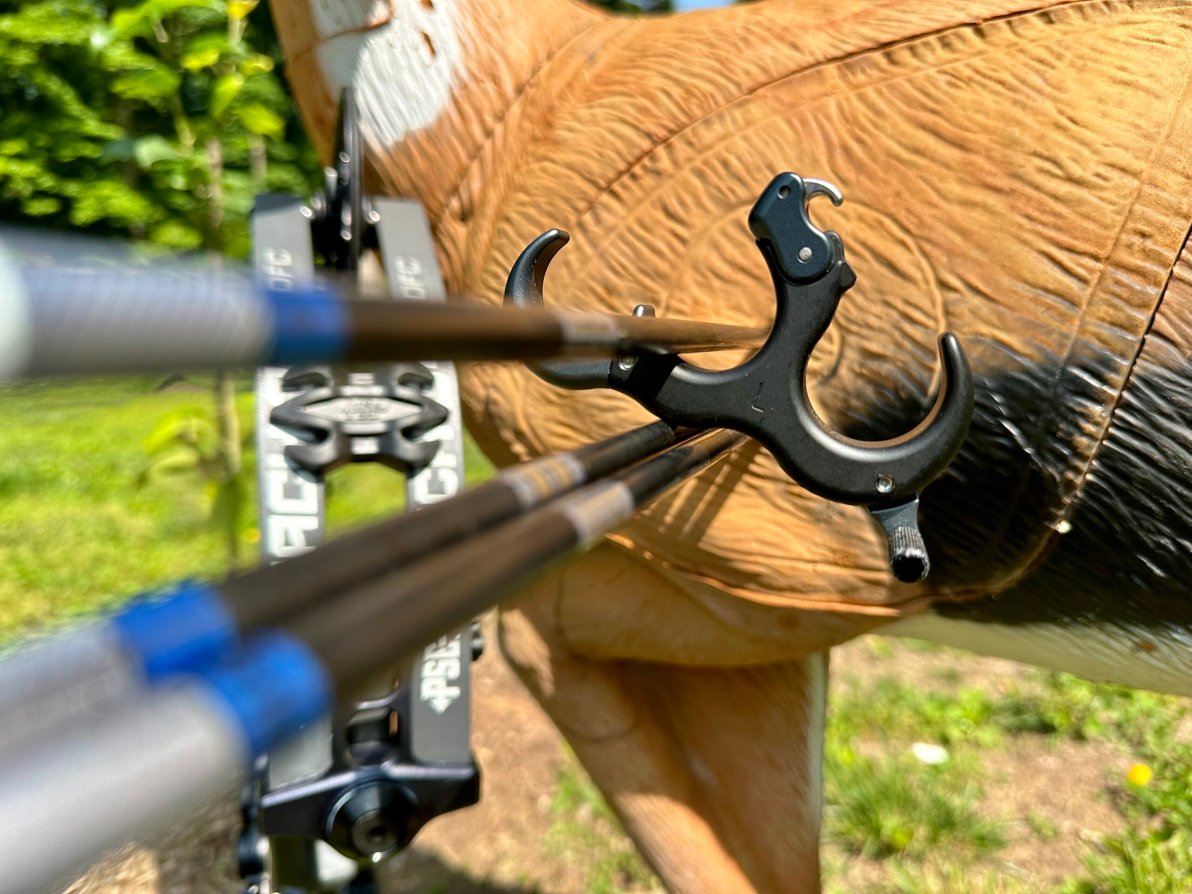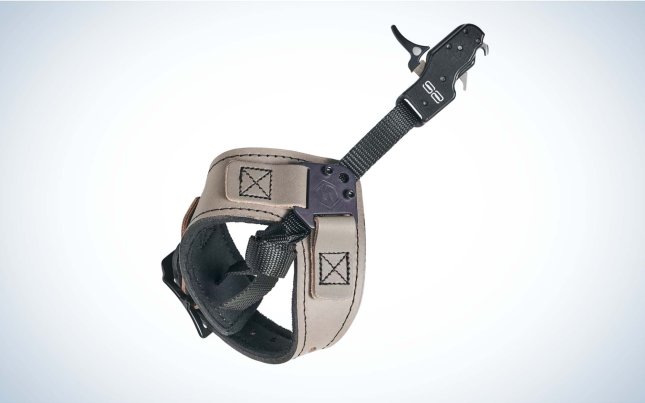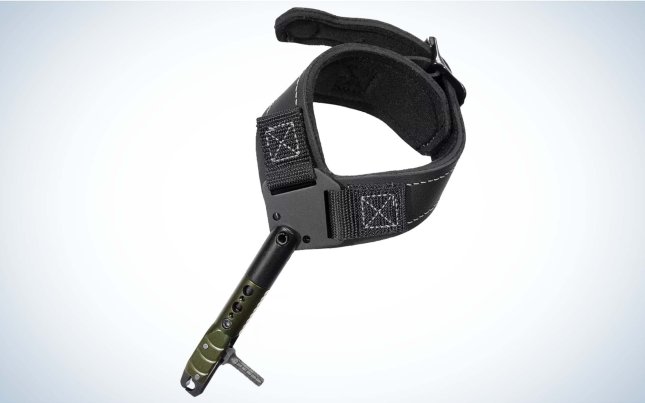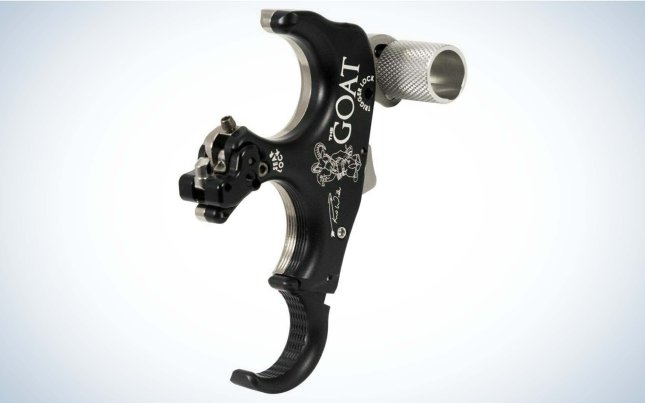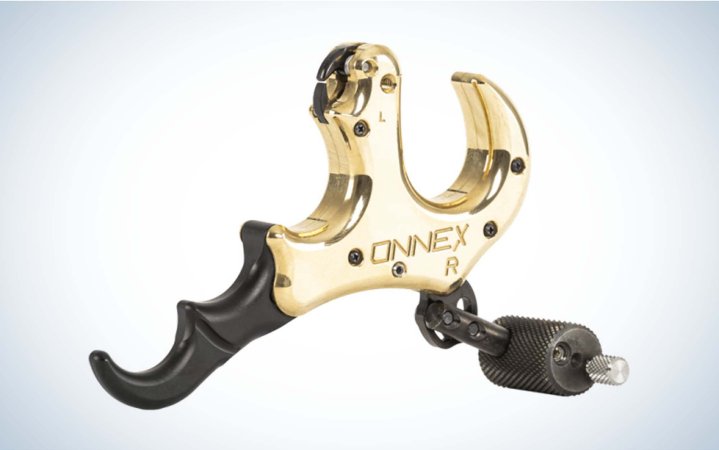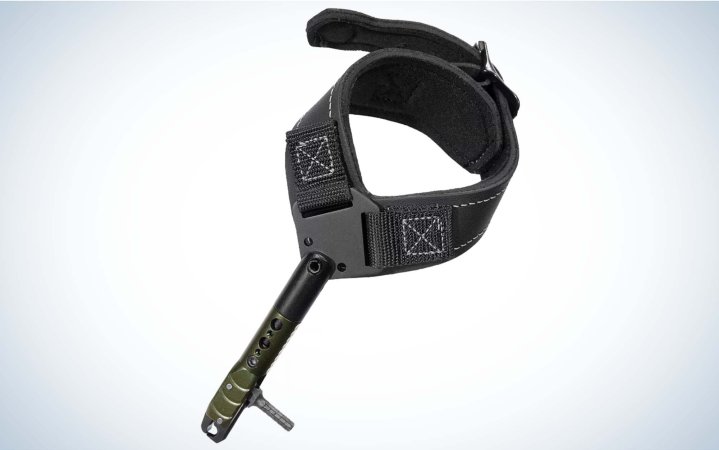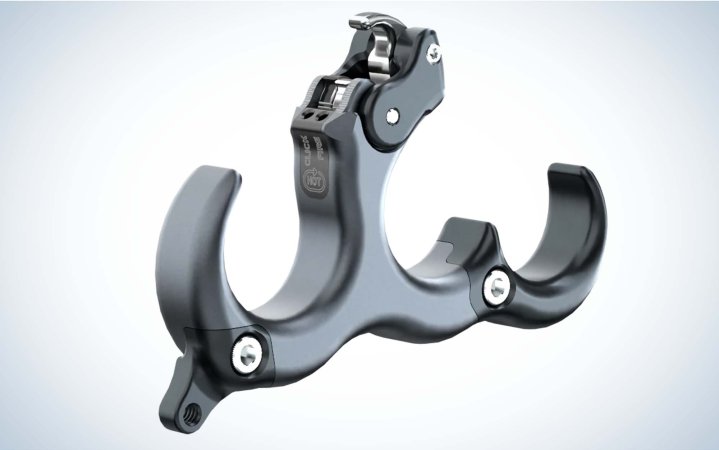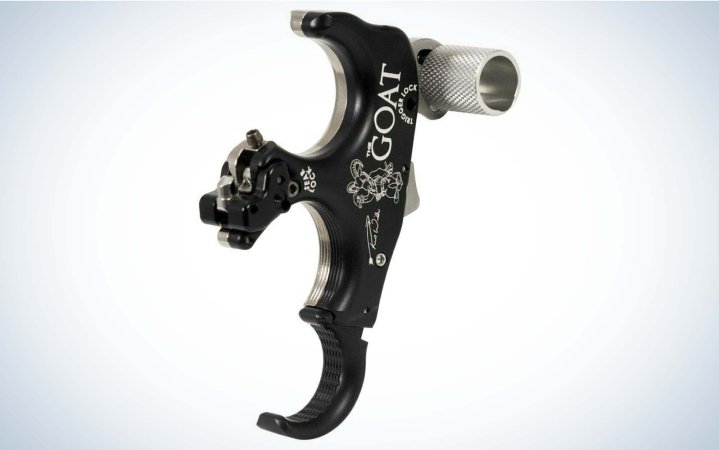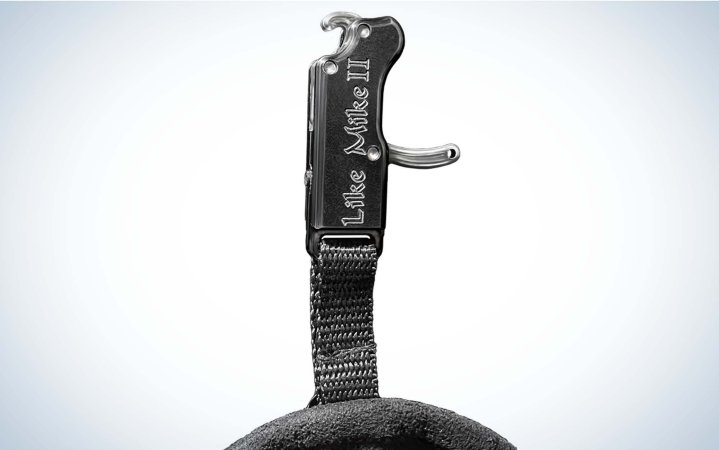We may earn revenue from the products available on this page and participate in affiliate programs. Learn More ›
For bowhunters, no piece of gear is more personalized than release aids. Everyone has their favorite style, which they set their favorite way, and it’s pretty hard to find two bowhunters who like the exact same release, set up the exact same way.
Heavy trigger, light trigger, no travel, some travel, thumb trigger, hinge, index finger, wrist strap, no wrist strap, and the options go on. That’s probably why Lancaster Archery Supply has 389 different release aids on their site. While which of those nearly 400 options you choose depends largely on personal preference, some releases are objectively better than others. For my picks for the best releases of 2023, I broke down the market into six of the most basic categories that will likely be relevant to bowhunters. I then chose my picks for the best bow releases for those categories based on my experience shooting nearly all the release aids on the market.
- Best Index Finger: Scott S2
- Best Practice Release: Stan Onnex Resistance
- Best Budget Index: Scott Little Goose II
- Best Hunting Thumb Trigger: Ultraview Button
- Best Hunting Hinge: Ultraview Hinge 2
- Most Versatile: TruBall Goat
- Best Budget Hand-Held: Booster Ignite
- Carter Like Mike II
How I Chose the Release Aids
You will notice there is no “Best Overall Release.” That’s in deference to the bowhunting community, because there are two primary camps in the release market—index finger and hand-held. If you’re a bowhunter who uses an index-finger release, you don’t like hand-helds. And if you’re a bowhunter who uses a hand-held release—thumb trigger or a hinge—you don’t like index finger releases. So to pick a “Best Overall Release,” I’d have to pick a camp, and that’s just not right, because neither style is better than the other. Whichever works for you is what’s “best.”
When choosing the release aids for this article I wanted to include selections that any archer would appreciate. As a Lancaster Archery Supply employee I have dozens of archery releases at my disposal. I’ve shot most of them and through that process I’ve found the releases that are easy to use, comfortable, and accurate. My final selections all have those qualities.
Best Release Aids: Reviews and Recommendations
Best Index Finger: Scott S2
Pros
- The dual sears mean the feel of the release doesn’t change from shot to shot or bow to bow
- Can be set light or heavy with some or no travel
- The open hook is ideal for fast hookups when bowhunting
- Comfortable wrist strap
Cons
- Among index finger releases carried by Lancaster Archery Supply, it’s the second-most expensive
Key Features
- Dual sears for consistency
- Open hook for fast connection to the string
- Separate micro-adjustments for tension and travel
- Infinite adjust web strap connecting wrist strap to release head
- Padded leather wrist strap
The Scott S2 is a wrist strap connected, index-finger release. Unlike most releases of this type, which are either spring loaded or cocked by pushing the trigger forward, the S2 has a separate cocking mechanism, which means it has dual sears. The benefit of dual sears is consistency from shot to shot and bow to bow.

The trigger on most index finger releases feels one way in your hand and then totally different on the bowstring at full draw. The draw weight of the bow affects the feel of the trigger. With the dual sears, the S2 feels and functions the same on every shot on every bow. Dual-sear releases are the most consistent trigger releases but are rare among index-finger releases.
The hook on the S2 is open, which means only one moving jaw. And it means hookups to the D-loop are fast and easy. You can feel your way into the loop rather than having to look at the release to watch two jaws close around the loop.

Micro-adjust screws provide individual adjustments for trigger tension and travel, so you can get this release activated the way you want. Similarly, the web strap connecting the wrist strap to the release head is infinitely adjustable, so you can get the head to sit exactly where you want in relation to your wrist.
The padded leather buckle strap is comfortable on your wrist, whether you’re walking around or at full draw.
Best Practice Release: Stan Onnex Resistance
Pros
- Excellent tool for combatting target panic
- It can be set as heavy or light as you want
- Thumb-barrel safety is ideally located for comfortable drawing
Cons
- Unless you really feel comfortable with it, it’s not ideal for some to use bowhunting
- Until you get comfortable with it, it can be scary to use
Key Features
- It’s set to be heavier than your bow’s holding weight
- Thumb barrel is a safety to keep it from firing
- Comfortable handle
- Built on the same handle as the Onnex Hinge and Onnex Thumb Trigger so you can switch among all release types and keep the same feel
- Open hook design with flexible string keeper that prevents release from falling off D-loop

The Onnex Resistance is a release every compound archer and bowhunter should own because it teaches you how to pull through a release rather than punch a release. You can’t punch it because there is no trigger.
The Stan Onnex Resistance is a unique type of handheld release that uses resistance as its trigger. So there is no actual trigger on this release. Instead, the archer turns a screw in the handle to set the firing mechanism heavier than a bow’s holding weight. You draw back while gripping the thumb barrel, which is the release’s safety that keeps it from firing. At full draw, you take your thumb off the barrel, and pull back on the release until the resistance increases to the amount you’ve set it for, and the release then fires.
This type of release forces the archer to just keep pulling through each shot, and that’s the only way to get the release to fire. So those fighting target panic can work through the panic by keeping the pin on target and simply pulling on the handle until the release fires. That action often kills the anxiety created by trying to punch a trigger when the sight pin approaches the aiming spot.
No matter what you do with compound archery, this is a key release to have for practice sessions. Any time you feel anxious while shooting, pick up the Onnex Resistance and spend some time with it to quash the panic feelings.
There’s no reason you can’t use this release for hunting. Still, because it activates when a certain amount of resistance is reached, it’s possible to get to that resistance level faster than normal in tense situations. Like when you’re taking aim at a trophy animal. If that happens, the release might fire before you’re ready. It also might be more difficult to fire under pressure. But this release is a great training tool when you’re calm on the range.
Best Budget Index: Scott Little Goose II
Best Budget Index
Scott Little Goose II
Pros
- Costs less than $75
- Single moving jaw promotes consistent releases
- Adjustable head
- Acts on a sear, as opposed to a spring, which creates the cleanest releases
- Comfortable strap
Cons
- With this type of release, the trigger feel changes as you change the bow’s draw weight. The lighter the draw, the lighter the trigger feels. The heavier the draw, the heavier the trigger feels.
Key Features
- Push the trigger forward and a single jaw closes against a fixed post to capture the D-loop
- Jaw flies open when sufficient trigger tension is applied
- Head barrel has multiple holes for adjusting distance between release head and wrist strap
- Head barrel swivels to prevent string torque
- Padded leather wrist strap
The Scott Little Goose II is the latest version of Scott Archery’s best-selling Little Goose release. It’s been around seemingly forever because it’s affordable, well made, and reliable. This is not the least expensive index finger release, but this is the best “budget” release because it offers the best value for what you pay. And what you pay is less than $75.
For that price, you get a release that operates off a sear, versus a spring. What that means is, you pull the trigger, which is holding a metal moon in place that keeps the single jaw closed and your D-loop contained. When the edge of the back end of the trigger clears the edge of the moon, the jaw flies open. You get a clean, consistent release every time, as compared to a spring-loaded release, where the jaws open and close as you pull and release the trigger.
That single jaw also promotes a consistent release. The jaw holds the D-loop at full draw, but when you activate the trigger, the loop slides across the straight, fixed-position post opposite the jaw. When two jaws move, it’s possible they move differently from shot to shot, which can cause the D-loop to come out differently.
As I mentioned, the Little Goose II is a release where the trigger tension needed to activate the release changes as the bow’s draw weight changes. So it’s light when the draw weight is light, and it gets heavier as the draw weight increases. But that doesn’t mean the trigger is heavy at 70 pounds. It’s still pretty light. It’s just heavier than if the draw weight is 40 pounds. The only adjustment in the Little Goose II is trigger travel.
Best Wrist Strap Thumb Release: B3 Exit Hunter
Pros
- You get the wrist strap with the release
- Simple to cock
- Open hook allows for fast connection to the D-loop
- Available in Cerakote finish which is strong and has no glare
Cons
- Release settings for trigger travel and tension are fixed and cannot be adjusted
Key Features
- Thumb trigger release connected to wrist strap
- Open hook
- Infinitely adjustable web strap connecting release to the wrist
- Large thumb barrel
- Comfortable, three-finger handle
More and more bowhunters recognize the benefits of drawing a bow with a handheld release connected to a wrist strap. Not many manufacturers offer a release-and-wrist-strap combo. Bowhunters have to buy extra parts to piece together their own. This is a combo package, and it’s a good one by a solid manufacturer.

The B3 Exit Hunter Thumb Release is a handheld, thumb-trigger release that comes with a wrist strap. Many bowhunters today choose thumb-trigger releases because they like how they draw, hold, and fire, compared to index-finger releases. And as they choose these handheld releases, they are adding wrist straps because of the aid they offer in drawing heavy draw-weight bows.
When you draw a bow with a handheld release alone, all the weight of the bow is put on your hand. When you connect that release to a wrist strap, you add your arm to the drawing process, and it makes the draw easier. It also makes it easier to hold the bow at full draw for extended periods.
A web strap connecting the release to the wrist strap is infinitely adjustable, so you can get the distance between the two exactly right for your shooting style. Also, you can remove the wrist strap if you want.
The Exit Hunter is available in an anodized finish or Cerakote. The Cerakote is a super-hard ceramic coating that can stand up to the abuse bowhunters are sure to inflict.
In the name of keeping things simple, the release cannot be adjusted for trigger tension or travel. But the folks at B3 have been around the industry for a long time, and the Exit Hunter is set basically with no travel, and it requires a little bit of pressure to fire. So it’s not scary light, nor is it too heavy.
Similarly simple, to cock the release, you simply have to press on the open hook. There’s no fumbling to try to find a separate cocking button.
Best Hunting Thumb Trigger: UltraView Button
Pros
- Arguably the most comfortable handle on the market, which precisely matches my pick for best hinge
- Big thumb barrel made to promote traction
- Wide range of adjustments
- Can be connected to a wrist strap
- Can be hung from a D-loop
- Releases the string crisply
Cons
- Expensive
- Currently only available in medium size
Key Features
- Thumb-activated trigger
- Handle shape based off measurements of hundreds of archers’ hands
- Heavy stainless steel or light aluminum construction
- Wrist strap connection built into finger extension
- Spring clip captures D-loop so release stays put when connected
- Internal “Ultraglide” system minimizes metal-to-metal contact
This release was just introduced in 2022, and you might be so you’re wondering, how can it be considered the best bowhunting thumb trigger when it’s just been around for one hunting season. That’s a valid question, but after spending a year with one, I think it’s a winner.

The UltraView Button is the culmination of years of meticulous research by the crew at UltraView. The handle was designed after engineers measured hundreds and hundreds of archers’ hands to figure out how to make a handle that fits most people. You’ll appreciate that research when you pick up this release. It doesn’t feel like any other thumb-button handle. It sits in your fingers comfortably with the right pressure in the right places.

The big thumb barrel is concave and has big grooves in it. It kind of looks like a monster truck tire. Those design features are intentional so that no matter how you like your thumb to interact with the barrel, you’re going to get the traction needed to make the release fire. And you can move the barrel in, out, left, and right a good bit to get it in precisely the right place.
The adjustments for trigger travel and tension are pretty generous. So whether you like the release to go off if you blow on it or you like to squeeze the trigger as hard as you can before it fires—or you’re somewhere in between—you can set it the way you want.
Internally, the Button features Ultraview’s “Ultraglide” technology, which utilizes washers to separate metal parts, making the release quiet and preventing future grittiness.
A key reason I picked the UltraView Button is that it’s virtually identical to the UltraView Hinge 2, which is my pick for best hinge.
Most target archers will have a hinge and a thumb trigger in their release pouches so they can switch between the two for training purposes or if conditions change during competition. Having a hinge and thumb trigger that fit the same and can be anchored the same is key to same-hole accuracy when switching between the two.
Bowhunters will benefit from owning and shooting both types of bow releases as well. A hinge will help stave off target panic and promote a relaxed aim. A thumb trigger is better suited to hunting situations when you might have to make a shot happen quickly.
Best Hinge: UltraView The Hinge 2
Pros
- Comfortable handle that matches the Button
- Individual moon adjustments for travel and click distance
- Hook positioned over middle finger for better leverage
- Can add a wrist strap via an add-on bracket
- Can use with or without a thumb peg
- Free try before you buy option
Cons
- Expensive
Key Features
- Hook releases the D-loop by rotating the handle
- Handle shape based off measurements of hundreds of archers’ hands
- Handle comes as three-finger or four-finger
- Add-on bracket available to attach wrist strap
- Micro-adjustable moons for fire and click-to-fire settings
- Can be set with or without click
Having a handle that matches the Button is a big plus for The Hinge 2, but it’s not the only reason it’s my pick. The handle and unique positioning of the string hook combine to make this one of the most user-friendly back-tension releases. It’s also easy to draw a bow comfortably with this release, without fear of punching yourself in the nose. And having individual moons for setting the travel position and the distance from click to fire is extremely beneficial. (I’ll explain that more in a bit.)
The Hinge 2 came before the Button in UltraView’s sequence of product offerings, and so it was the release that introduced the archery world to their super-comfortable and form-fitting handle. Hinge releases, no doubt, are more associated with target archery than hunting, but there are a growing number of bowhunters picking up these releases.
Leverage points are critical with hinges because you need leverage on one side of the handle when drawing and on the other side when firing. The Hinge 2 makes it comfortable to draw, hold, and activate the release because the leverage points across the user’s hand are in the right places.

As mentioned, the Hinge 2 has separate moons that can be set for travel and click distance. The travel moon is set to make the hook release the string at a certain point in the rotation of the handle, and it’s up to you to set it for your comfort.
The click moon can be set to create an audible click just before the release fires, so the user knows the release is imminent. Infinite adjustment of that click-to-fire distance allows the user to set it precisely where you want. If you prefer no click, you can set the Hinge 2 without a click as well.

The Hinge 2 has a magnetic hook return, so the hook is always ready to connect to the D-loop, and the magnet eliminates the noise of a flopping metallic head. That feature was included primarily for bowhunters. UltraView also makes a bracket that can be added to the Hinge 2 so a wrist strap can be connected to the release.
The Hinge 2 is an expensive release, but like the best hunting arrows, you get what you pay for.
Most Versatile Release: TRUBall GOAT
Most Versatile Release
TRUBall GOAT
Pros
- It’s one release that can be used two different ways
- Easy to convert back and forth
- Comfortable handle
- Separate adjustments for each configuration
- Price is nice when you figure you’re getting two releases
Cons
- The pin used in the conversion is small and easy to lose
- No connection for a wrist strap
Key Features
- Hand-held, thumb-activated trigger release that converts to a hinge
- Half aluminum, half brass gives the release some nice heft in the hand
- Open hook
- Can be used as a two-finger, three-finger, or four-finger release
- Finger extension can be moved forward or back to change the feel of the release at activation
The only thing better than having a thumb trigger and hinge with matching handles is to have one release that can be shot both ways. Now you’re really talking about matching geometry.
The GOAT is a bow release that comes from the factory set up as a thumb trigger, but is easily converted to a hinge simply by turning a couple screws and moving a pin. What’s more, the adjustments for trigger travel and sensitivity when the release is set as a thumb trigger are separate from the adjustment for hook travel when the release is set as a hinge. So you customize each setting, and your settings don’t change when you move from one configuration to the other.

As a thumb trigger, you can set this release with zero travel and get a crisp release with a fairly wide adjustment range for trigger tension. As a hinge, this release has good leverage points to make the release rotation smooth simply by pulling through the shot.
The release was designed in conjunction with Reo Wilde, who is one of the most decorated target archers in the U.S., so it has a strong pedigree. It’s got that target release feel, since it’s anodized aluminum on one side and nickel-plated brass on the other. The release has heft, which just feels better in the hand while you’re shooting.
The hook is open, so it will not fully capture the D-loop. That means you can’t hang it on the loop while your bow is hanging in the tree. However, an open hook means you don’t have to look at the release to hook it to the D-loop. You can keep your eyes on that big buck while you feel your way into the D-loop. Or, in low light, you can connect to the loop by feel, rather than having to see it. Some bowhunters prefer that simplicity.
Best Budget Hand-Held: Booster Ignite
Best Budget Hand-Held
Booster Ignite
Pros
- Single moving jaw facing a solid post
- Can be clipped to the string and left there
- Separate adjustments for travel and tension
- Comes as a three-finger release, but includes an extension to make it four-finger
- Costs $100
Cons
- There are other less expensive hand-helds
- The trigger is not as crisp as more expensive thumb triggers
Key Features
- Hand-held, thumb-activated trigger
- Comes set as a three-finger release, but an extension is included to make it a four-finger
- Wrist lanyard included
- Separate adjustments for trigger travel and tension
- Adjustable thumb-barrel position
- Lightweight
The Booster Ignite is a nice release that is not the least expensive hand-held out there, but it is much higher functioning than the cheaper models. The $100 price is a bargain for this release’s features.

It has a comfortable metal handle with a solid thumb trigger that can be adjusted to the most comfortable position for the user. The release operates how I like—press the trigger, and a single hook flies open when an adjustable amount of tension is applied. Most of the cheaper hand-held releases are spring loaded, so the jaws open and close as you pull and release the trigger. Those are nowhere near as consistent as the Ignite.
Push a button on the back of the release to set the trigger. When you do that, the jaw automatically closes against the solid post, so there is no need to manipulate it with a frigid finger on a frosty November morning.
The adjustments for trigger travel and tension are generous. You can have the release fire with very little tension, or a lot; and with zero travel, or a fair amount. Set light with zero travel, this release is money. It rivals other, more expensive models, but at a fraction of the cost.
Carter Like Mike II
Best Index Finger
Carter Like Mike II
Pros
- Zero travel
- Open hook for easy D-loop connection without looking
- Nylon strap connection lets you set the head precisely where you want it
- Comfortable wrist strap with buckle
- Especially good for archers who like to set the trigger heavy
Cons
- You have to hold down the hook with a finger while you set the trigger
- Expensive for this release type
Key Features
- Index finger trigger attached to a wrist strap
- Sets by holding the hook with index finger and pressing trigger set with thumb
- Hefty head is easy to grab onto to hook to D-loop
- Trigger sensitivity has wide adjustability
- Zero trigger travel
The Carter Like Mike II is one of those releases that has been around for a while, and has earned its stripes through the test of time. It was the best index finger release pick in 2022, and it remains one of the best release aid options.
It’s an open hook release, which means it’s ideal for hunters who like to keep their eyes up while connecting their release to the string or would rather feel their way to the loop in low light. You hold the hook with your forefinger and push the trigger set with your thumb. It feels awkward the first few times, but you get used to it quickly.

The reason the Like Mike II is my pick as the best wrist strap is primarily for its action. There is zero trigger travel, and all you have to set is the tension. This release is especially ideal if you like a heavy trigger set because the trigger just feels solid, and the release head doesn’t twist as you’re pulling through the shot.
When the release breaks, it’s as clean a release as you can imagine. There’s a faint “click,” and the arrow is gone. A number of top target archers who shoot index-finger releases use this release because of its adjustability and consistency.
The nylon connection strap is ideal for getting the release head to sit precisely where you want it for optimum engagement between your finger and the trigger. And the buckle strap ensures consistent, comfortable attachment to your wrist.
Things to Consider When Buying a Release

Choosing the best bow release is a lot like choosing the best compound bow, you have to try a bunch to see what you like best. But, here are some qualities you should look for in good bow releases and answers to common questions.
Hinge vs. Trigger Release
Hinge releases have no trigger, so they are great for killing target panic. The handle must rotate for the release to fire, which requires the user to simply keep pulling back after coming to full draw. Many bowhunters are going to find the lack of a trigger unnerving. They want to control exactly when the shot goes off, especially in urgent situations, like when they stop a running whitetail with a grunt.
It is possible to make a hinge go off on command, but it’s not as easy to do as it is with a trigger. When activated properly by simply pulling at full draw, a hinge produces surprise shots that are associated with pinpoint accuracy.
Index vs. Hand-Held
This is the first issue you must resolve because the style you choose takes you to very different releases. What bowhunters like about index-finger releases is the wrist strap aid in drawing back the string, and the trigger affords great control over the shot. You decide when the bow fires. Also, the release is always on your wrist, so it’s always at the ready.
What bowhunters like about hand-helds is they promote cleaner shots. Index-finger releases are difficult to shoot without punching the trigger. And when you punch, you can flinch. Thumb triggers and hinges can be activated to create surprise shots that kill anticipation. Also, some bowhunters don’t like anything attached to their wrist while they’re sitting in a tree stand or stalking. With some hand-helds, you can hang the release on the D-loop until it’s time to shoot.
Wrist Strap
If you use an index-finger release or you like to connect your hand-held release to a strap, so it’s always at the ready while hunting, be sure to think about how the strap connects to your wrist. The only two options are a buckle or Velcro. Velcro might seem nice because it’s infinitely adjustable, but that also leads to inconsistent connection. And Velcro can slip over time.
A buckle, on the other hand, attaches via the same hole in the strap every time. Yes, it might feel like one hole is too tight, but the next one is too loose, but consistency is the key to achieving the same anchor from shot to shot. And the buckle does that better in the long run.
Jaw Function
There are two ways the release jaws open. Either they are spring loaded, or they operate off a sear. The spring-loaded releases generally are going to be less expensive, but the sears are far more consistent.
As I’ve described, spring-loaded releases open and close the jaws as you press and release the trigger. A certain amount of trigger travel is required with these releases to open the jaws far enough to release the D-loop.
Sears operate opposite that. You pull until the sear releases the trigger, and the jaw or jaws then fly open. They can be set with zero trigger travel, which many bowhunters prefer.
FAQs
Releases cost anywhere from about $35 to nearly $400. Generally, index-finger releases tend to be less expensive than hand-helds. The cost variation is typically due to quality of construction and quality of operation. Anyone who has shot guns has experienced very crisp triggers and triggers that seem to have a lot of play, or are gritty to pull. Guns with the nicer triggers usually cost more. The same goes for archery releases.
Hinge releases definitely are for more advanced archers. Learning how to safely draw with a hinge and not have it fire, and then having the discipline to slowly work the hinge to fire while maintaining a consistent aim takes time behind the bow. These are not for beginners. But if you spend a lot of time shooting a hinge in target leagues or just messing around at home, and you feel comfortable with one, then a hinge might be the right choice for you. Operated correctly, they produce very clean, surprise shots, which is critical for consistent accuracy.
Trigger tension is a very personal choice, so setting it is entirely up to you. However, a good place to start is to set the trigger so you can at least rest your thumb or index finger on it without it firing. If it’s set so light that you can’t touch it without it firing, that’s likely to cause problems in the woods. But if you can rest your finger on the trigger and then begin the activation process, that’s a good place to start.
Final Thoughts on the Best Release Aids
The compound bow release market is one of the most diverse that you’ll find. There are many manufacturers with lots of offerings. That’s a testament to the fact that no two people are alike when it comes to finding the release. Play around with a few at your local pro shop before you decide on one. And if it turns out you don’t like it, try a different style. The best bow releases feel like an extension of your hand and shots break cleanly without anticipation. When you find a release aid like that, it’s the perfect release for you.
- Best Index Finger: Scott S2
- Best Practice Release: Stan Onnex Resistance
- Best Budget Index: Scott Little Goose II
- Best Hunting Thumb Trigger: Ultraview Button
- Best Hunting Hinge: Ultraview Hinge 2
- Most Versatile: TruBall Goat
- Best Budget Hand-Held: Booster Ignite
- Carter Like Mike II
